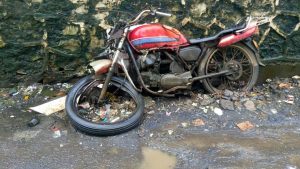Buying a salvage motorcycle from online auctions can be an exciting and cost-effective way to acquire a unique vehicle. However, there are important factors to consider before making a purchase. From vehicle history to legal requirements, here are 5 key considerations to keep in mind when buying a salvage motorcycle from online auctions.
1. Vehicle History and Condition

When we consider purchasing a salvage motorcycle from an online auction, a thorough assessment of the vehicle’s history and condition is crucial. This step is not just about the aesthetics; it’s about understanding the full story of the motorcycle and its roadworthiness. We always emphasize the importance of inspecting the motorcycle’s body, engine, and interior to assess the extent of damage and evaluate the mechanical and electrical systems.
Research and due diligence are key to making an informed decision. Vehicle history reports are invaluable, offering insights into past accidents or a salvage title, which can significantly affect the motorcycle’s value. Here’s a quick checklist to guide you through the inspection process:
- Examine the Hull: Look for signs of damage or structural issues.
- Inspect the Engine: Listen for unusual noises or vibrations.
- Evaluate the Interior: Check for water damage, mold, or deterioration.
- Assess the Safety Equipment: Ensure that airbags, seat belts, and other safety features are working properly.
By taking the time to thoroughly evaluate the motorcycle’s history and condition, we help you make an informed decision and avoid surprises post-purchase. Remember, all vehicles sold are “as is, where is,” making this step indispensable.
We also provide maintenance and repair tips for motorcycles, including chain tension adjustment, brake pad replacement, and essential tools. This not only ensures safety but also offers customization and cost-saving benefits for repairable motorcycles.
2. Repair and Restoration Costs
When venturing into the world of salvage motorcycles, it’s crucial to have a clear understanding of the potential repair and restoration costs. Assessing the vehicle and determining the repair requirements is the first step before placing a bid. This assessment will help you decide if the motorcycle is a worthy investment and if the costs align with your budget.
Parts availability is another significant factor. Some models may need specialized parts that are pricier and harder to find, potentially increasing the overall cost. Here’s a quick rundown of common types of damage and their potential impact on restoration costs:
- Mechanical Damage
- Frame Damage
- Bodywork Damage
- Electrical System Damage
Investing in a salvage motorcycle can be a savvy financial move if done correctly. However, it’s essential to weigh the pros and cons, considering both the short-term and long-term implications of your purchase.
Remember, while the initial acquisition cost of a salvage motorcycle might be lower, the total investment should include the repair expenses. We encourage you to consider flexible financing options, such as peer-to-peer lending and personal loans, which can ease the burden of upfront costs. Keep in mind the insurance requirements for salvage motorcycles, as they may differ from those for clean title bikes.
3. Auction Bidding Strategies

When participating in online auctions for salvage motorcycles, it’s essential to have a clear strategy. We recommend setting maximum bids and closely monitoring the auction’s progress. This approach allows us to control our spending and potentially save money. Additionally, understanding the market value of the motorcycle you’re interested in is crucial. Here’s how we ensure we’re bidding wisely:
- Research market values to set a realistic budget
- Compare recent auction results for similar motorcycles
- Use online valuation tools to determine a fair price range
By being knowledgeable about the market and bidding strategically, we make informed decisions that align with our financial goals.
Remember, at SalvageAutosAuction.com, vehicles are sold ‘as is’ with no warranty. It’s our responsibility to carefully inspect the motorcycles and review all available information, including condition reports and sale lights, which indicate the vehicle’s sale conditions.
It’s also important to be aware of the auction’s policies and terms. As buyers, we must ensure that we are registered, have a visible Bidders Badge, and understand the binding arbitration representation of the vehicle’s condition. SalvageAutosAuction.com offers repairable autos from Copart Autos Auctions, and we must adhere to their registration and payment terms.
4. Legal and Documentation Requirements

When we venture into the realm of purchasing a salvage motorcycle from online auctions, we must tread carefully with respect to legal and documentation requirements. Understanding the auction’s terms and conditions is paramount; it ensures that we are fully aware of our obligations and the auction’s policies. For instance, we need to be cognizant of the sale conditions, which are often indicated by a color code system (Green, Yellow, Red, and Blue-TA), and verify that all details on the auction sales receipt are accurate before signing.
Documentation is not just about ownership; it encompasses the vehicle’s entire history and the seller’s representations. Sellers are held responsible for the accuracy of all vehicle descriptions, including condition reports. As buyers, we must review these thoroughly to avoid any surprises post-purchase. Here’s a quick checklist to keep in mind:
- Confirm the vehicle’s sale conditions and price.
- Check for completeness in seller’s representations.
- Review the auction’s policies on buyer and seller responsibilities.
- Ensure you have a visible Bidders Badge when participating.
It’s crucial to remember that the auction’s sale light/video display is a binding arbitration representation of the vehicle condition. Make sure the motorcycle you’re bidding on is presented under the correct light.
Lastly, always be prepared to indemnify the auction against any losses that may arise from policy breaches. This includes being well-informed about the vehicle you’re bidding on, including its warranty status and any test-driving liabilities.
5. Post-Purchase Inspection and Registration
After securing your salvage motorcycle from an online auction, we must prioritize a post-purchase inspection. This critical step ensures that the motorcycle meets safety standards and helps us identify any hidden issues that might not have been apparent during the auction. Here’s a simple checklist to guide us through the process:
- Conduct a detailed inspection of the motorcycle’s frame and body for any structural damage.
- Examine the engine and mechanical components for functionality.
- Check the electrical system, including lights and indicators.
- Verify that all fluids are at the correct levels and uncontaminated.
Once the inspection is complete, the next step is to handle the registration process. Salvage motorcycles often come with specific documentation requirements that vary by state. It’s essential to gather all the necessary paperwork, such as the salvage title, bill of sale, and any repair documents, to ensure a smooth registration process.
Remember, the goal is not just to get the motorcycle on the road, but to ensure it’s safe and reliable for the long haul.
Finally, be aware of any auction-specific rules or conditions, such as the need to review auction sales receipts and confirm vehicle prices and disclosures. It’s our responsibility to understand these details before signing any documents.
Conclusion
In conclusion, buying a salvage motorcycle from online auctions can be a rewarding and cost-effective option for motorcycle enthusiasts. However, it is crucial to consider the vehicle’s history, condition, and the extent of damage before making a purchase. Conducting thorough research, inspecting the motorcycle in person, and utilizing the information available on online auction platforms are essential steps in the due diligence process. By carefully weighing the pros and cons and seeking professional advice, buyers can make informed decisions and potentially find great deals on salvage motorcycles. Visit Salvage Bikes Auction to explore a wide range of salvage, clean, used, wrecked, damaged, and repairable motorcycles available for auction.










